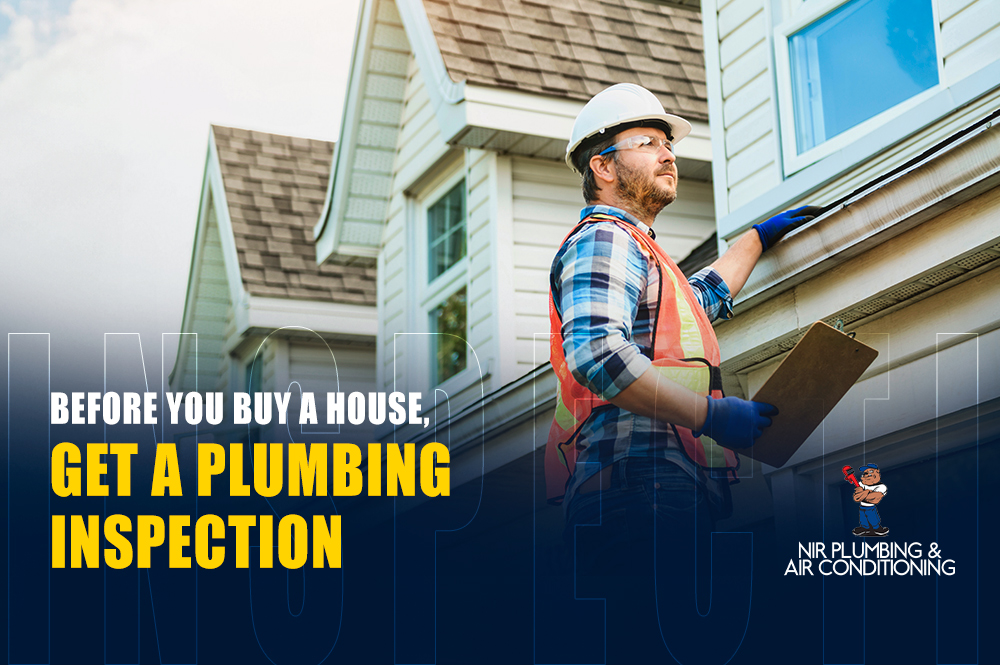Overview: Buying a home is one of the most significant investments you’ll ever make. While it’s easy to get swept up in the excitement of a beautiful kitchen or a cozy backyard, it’s crucial to pay attention to the less glamorous aspects, especially the plumbing. Read more!
Buying a house is a monumental decision, a journey that involves countless considerations, from location and size to layout and aesthetics. Yet, amidst the excitement of finding your dream home, there’s one critical aspect that often hides in plain sight – the plumbing system.
Ignoring the pipes and fixtures may lead to unforeseen challenges and expenses down the line. In this blog post, we’ll look into the importance of getting a plumbing inspection before sealing the deal on your new abode.
The Unseen Culprits
Picture this: You walk into a beautifully staged home with gleaming countertops and spacious rooms. Everything seems perfect until you turn on the faucet, only to be met with a disheartening dribble of water. A plumbing disaster waiting to happen can quickly turn your dream home into a nightmare.
Plumbing issues are often concealed within walls and underground, making them difficult to detect during a standard home viewing. Problems like old pipes, leaks, clogged drains, or inefficient water heaters can be costly to repair or replace. An inspection uncovers these hidden issues, giving you a clear picture of what you’re getting into.
>> Related Reading: The Financial Aspects of Ignoring a Plumbing Leak
Protecting Your Investment
Your home is one of the most significant investments you’ll ever make, and safeguarding it should be a top priority. A thorough plumbing inspection provides invaluable insights into the condition of the pipes, drains, and sewage systems. Identifying potential problems early on can save you from costly repairs in the future.
It’s not just about the visible aspects of a property; it’s about understanding what lies beneath the surface.
Water Quality Matters
Beyond the visible signs of plumbing issues, a comprehensive inspection also considers water quality. Poor water quality can impact your health and the longevity of your appliances. Testing for contaminants, ensuring proper water pressure, and evaluating the functionality of water heaters are crucial components of a plumbing inspection that contribute to the overall well-being of your home.
Negotiating Power
Armed with the knowledge gained from a plumbing inspection, you’re in a better position to negotiate with the seller. If issues are identified, you can either request repairs or negotiate a reduction in the asking price. Being proactive about plumbing inspections not only protects your investment but also empowers you during the negotiation phase, ensuring a fair deal for both parties.
What Does a Plumbing Inspection Include?
A comprehensive plumbing inspection by a licensed professional will examine:
Pipe Material and Condition Assessment: Inspectors check the type of piping (PVC, copper, galvanized, etc.) used in the home. They also assess the age and condition of the pipes, looking for any signs of corrosion, leaks, or outdated materials that might require replacement.
Water Heater Inspection: The age, capacity, and overall condition of the water heater are evaluated. Inspectors look for signs of rust, leaks, or inefficiency and check the installation quality.
Drainage System Evaluation: All drains are tested for flow rate and blockages. Inspectors look for slow drainage, backups, and signs of potential sewer line issues.
Water Pressure Testing: Water pressure is measured to ensure it is within a safe and functional range. Both high and low pressure can indicate problems like pipe damage or obstructions.
Leak Detection: A thorough search for leaks in visible pipes, under sinks, in basements, and around toilets and faucets. Advanced methods like pressure testing or infrared cameras may be used to detect hidden leaks.
Fixture Inspection: All faucets, showers, bathtubs, and toilets are checked for proper operation, leaks, and water flow. Inspectors also look at the caulking and seals around fixtures for signs of water damage.
Sump Pump and Ejector Pump Examination (if applicable): Testing of sump pumps and ejector pumps for proper operation and backup systems. Inspectors check for correct installation and potential issues with discharge.
You might be interested in reading this >> Is Your Sump Pump Ready for Summer Storms?
Checking of Ventilation Systems: Ensuring that all plumbing vents are correctly installed and free of obstructions. This includes checking roof vents and air admittance valves for proper function.
The Role of Professional Inspections
While a DIY inspection may seem tempting, the complexities of plumbing systems require the expertise of a professional. Hiring a licensed plumber to assess the property thoroughly ensures that no detail is overlooked. A professional inspection may reveal issues that are not immediately apparent, such as hidden leaks within walls or underground pipes.
In Summary
Before you sign on the dotted line for your new home, remember the importance of a plumbing inspection. It’s not just about checking boxes; it’s about ensuring the long-term integrity of your investment.
The hidden world of pipes and drains might not be as glamorous as a beautifully designed kitchen, but it’s a crucial aspect that can make or break your homeownership experience. Prioritize a plumbing inspection, and you’ll be taking a proactive step towards a future filled with comfort, peace of mind, and a home that stands the test of time.
Visit NIRPlumbing for more!


